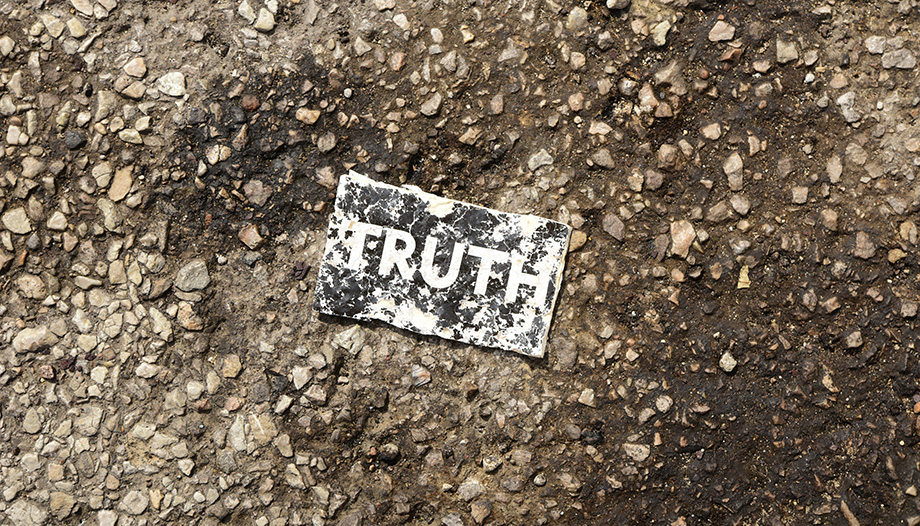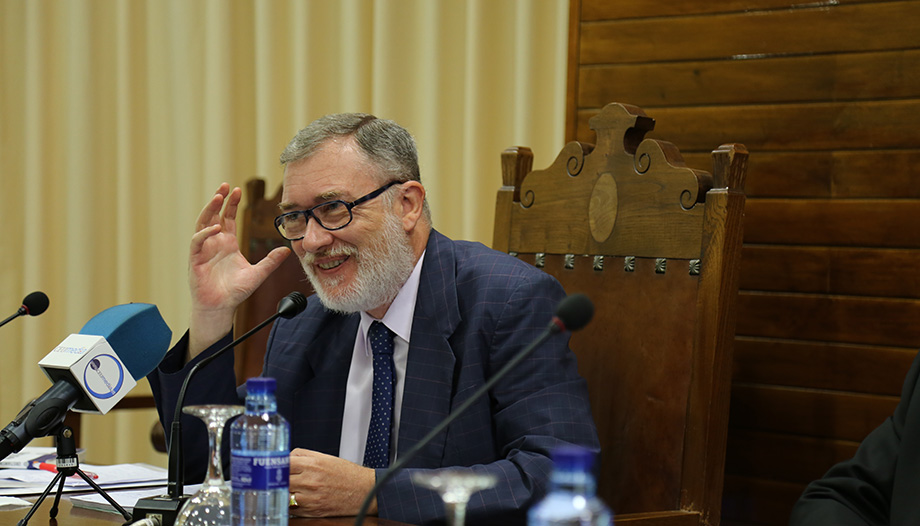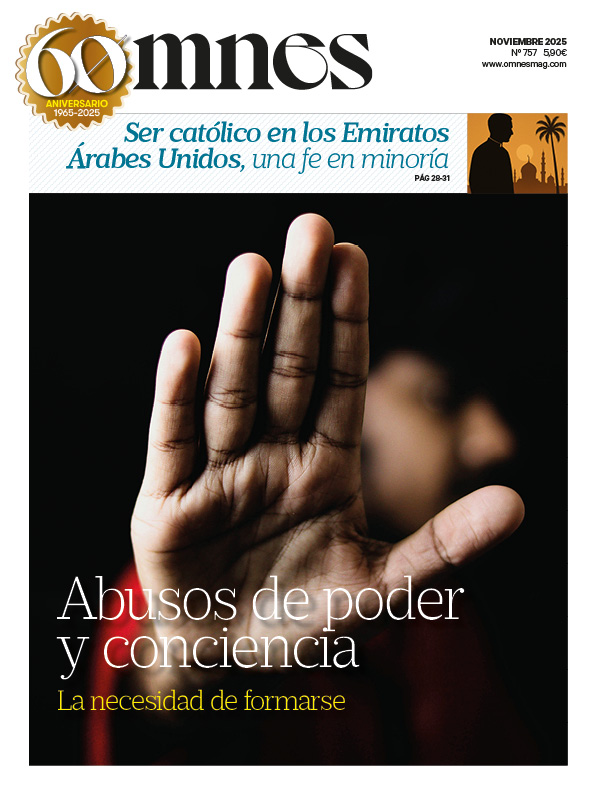A report made public in Vienna by OIDAC Europe, your Latin American partner OLIRE and the IIRF (International Institute for Religious Freedom), on self-censorship among Christians, has shown an advanced degree of social pressure driven by intolerance. And one of the authors, Friederike Boellmann, has stressed that "the German case reveals that Universities are the most hostile environment. And the highest degree of self-censorship I found in my research in academia."
Almost in parallel to the studies in the aforementioned report, José María Barrio, a professor at the Complutense University of Madrid, has written a wide-ranging articlewith this meaningful title: 'Truth is still very important, also at the University'". In his opinion, "society has the right to expect from the University a supply of people who know how to discuss respectfully, with arguments, and who take their interlocutors seriously, even when they express arguments contrary to their own. In this field, the University has a role that is difficult to replace".
There is "a virus that has been corroding the University since Bologna," he says. It has been discouraging "rational discussion, which is precisely one of the main tasks for which the University was founded, in the path of the Academy that Plato founded in Athens, and in whose wake some of the most relevant progress of Western culture has been recorded".
In conversation with José María Barrio, current issues of interest arise, and names such as Millán-Puelles, Juan Arana or Alejandro Llano, as well as Deresiewicz, Derrick and Jürgen Habermas.
Professor, what has motivated your reflection on truth in the university environment?
̶ I have the impression that in many university environments dialectical rationality is at risk of disappearing in favor of a merely instrumental and technocratic rationality. If any trait can identify what the University has aimed at throughout its history and what constitutes its nature-at least what it was "born" to be- is the pretension of being a space apt to discuss with reasons, with logically well-armed and rhetorically well-presented arguments. But pressures from outside the University introduce the "anti-logic" of the "escrache", of the cancellation of certain speeches, due to ideological interests completely alien to the interest for truth.
There are topics of theoretical, anthropological, political or social importance that are increasingly difficult to talk about, and there are agencies that arrogate to themselves the authority to decide what is and what is not to be talked about in the university, and, of what is talked about, what should be said and what should be kept quiet. Such mental restrictions are anti-academic, anti-university and anti-intellectual. To veto the discrepancy on the part of those who hand out cards of democrat or homophobe, as if they were bulls and anathemas, besides being not very congruent in a public University, is culturally shabby and mentally not very neat. It is tyrannical. And it is the final straw for the University.
You have spoken of lies as a revolutionary weapon, and you have written that truth is no longer of interest, that it has been replaced by post-truth. Even in the Bologna process the term truth disappeared.
̶ Of course, that is not what I say. I rather deplore that someone says that knowing what he is saying. Lenin invented the lie as a revolutionary weapon, and it has been revitalized by some who try to emulate him, like Pablo Iglesias in Spain.
The fact that there is no mention of truth in the Bologna documents, or that the Oxonian dictionary has authorized the infectious word "post-truth", is undoubtedly a symptom that something is wrong with the University. But as long as humans continue to be rational animal truth will continue to be important to him, because reason is not only worth to count votes, money, or likes. It is also a faculty of knowledge, and to know is to recognize what things really are; otherwise we would have to speak rather of ignorance, not of science but of nescience.
As a professor of philosophy, he has no qualms about putting his finger on prestigious American universities and their anthropological vision.
̶ I am not the only one who has pointed out that sore spot. I think it is much more knowledgeably pointed out by William Deresiewicz, American professor of English literature, in his recent book Excellent flock, which I strongly recommend to anyone interested in this process that leads to turn the University into a factory of straw souls.
You speak of a process of university demolition. What do you think of the university vision and the challenges of the university professor that professors such as Millán-Puelles or Juan Arana have put forward?
̶ I would mention many others on this list, and I would highlight the also retired professor Alejandro Llano. I fear that, unless the current state of affairs takes a very radical turn, the University will have to be rebuilt outside the current campuses. There are, however, egregious exceptions. I recommend reading the book by Christopher Derrick entitled Fleeing skepticism: A liberal education as if truth counted for something. He recounts an experience he had, during a sabbatical period, on a North American campus at a time when he was beset by a discouragement that today affects many.
For my part, I know of universities in South America where a genuine university sensibility is still being cultivated. A feature that identifies them is that they are not only concerned that their graduates "succeed" in the labor and socioeconomic aspect. Naturally they are not insensitive to this. But above all, they aspire to be able to harbor a well-founded hope that they will never engage in fraudulent or corrupt practices.
Let us listen to a brief reflection on the beginnings of universities and theology.
̶ The first Universities were founded to take up the heritage and continue the lineage of the Academy founded by Plato in Athens, and their original embryo were the cathedral schools in the high European Middle Ages. It was precisely the high self-critical potential of Christian Theology that was the initial catalyst for the most important academic research and reflection, and, of course, that has driven it to open up to new humanistic, scientific, social and artistic horizons and perspectives, and even to the horizon of technology.
Journalism is defended as an element of control of power, through truth, and disappointments arise when it is perceived, according to others, that it is rather intoxicated by power. How do you see this issue?
̶ That unfortunate word, post-truth, was originally coined to mention a sociocultural reality that has been making its way mainly in the world of communication and, above all, with the emergence of social networks.
The phenomenon, in its essential core, is the widespread impression that in the processes of public opinion formation, objective data no longer count as much as narratives, "stories" and, above all, the emotional elements that they are capable of arousing in the public. Something similar happens with social networks: it seems that the important thing is to make oneself heard, and what is less important is to verify the validity of what is being said. Many networks have become -perhaps they were from the beginning- mere aggregators of people who have the same prejudices and who do not seem at all to want to get out of them to turn them into judgments.
That human beings are not pure reason with legs, but are quite impressionable -a reed shaken by the wind, as Pascal said- was not discovered the day before yesterday. But what I find most pathetic in this case are not the ideological ingredients or the emotional ornamentation of the stories -probably there is not always a malicious intention to deceive-, but the little attention, the frivolity, the superficiality and the total absence of critical contrast with which many information that would deserve some seriousness are dispatched.

In your opinion, what is, what should be, the true contribution of the university to society? You point out that restoring the prestige of truth is the main urgency of the university, correct?
̶ Right. To restore the prestige of truth, in short, to make it once again be valued as something very important for human beings, is to open spaces for true dialogue, which is something in serious risk of extinction among us. There is much debate but little discussion. Discussion only makes sense if there is truth/s, and if there is the possibility, within the limits of all that is human, of getting closer to it/them. Conversely, if truth does not exist, or is completely inaccessible to reason, what is the point of discussion? As Jürgen Habermas has said on more than one occasion, discussion is a meaningful praxis only as a cooperative search for truth. (kooperativen Wahrheitssuche), often of the real solution to a practical problem.
Society has the right to expect from the University a supply of people who know how to discuss respectfully, with arguments, and who take their interlocutors seriously, even when they express arguments contrary to their own. In the civil and socio-political space it is necessary to have people willing to contribute to the common good in cooperative environments of serious discussion. In this field, the University has a role that is difficult to replace.
If the challenge of university education were purely professional training, aimed at training effective managers who apply protocols, we could achieve this much more effectively and quickly, and we could save ourselves a very expensive institution. What is not improvised is that people should be able to think thoroughly and rigorously, and that they should know how to deal with complex and multifaceted problems, with many facets, including human ones, which cannot be tackled just by pushing buttons, bureaucracies or prescriptions.
We confuse leadership with mediocre technocracy. It is the mediocre who are able to prosper who end up leading, not the best or the most intelligent. This is the virus that has been corroding the University since Bologna.
We conclude. Professor Barrio tries to show in his exposition "some toxic elements of the socio-cultural atmosphere that negatively influence the work of the University, and that result in losing the reference of the value that truth has for the human being". For those who wish to read more, you can read and download for free his text at View of The truth is still very important, also at the University (usal.es) The technical reference is Theory of Education. Interuniversity Journal, 34(2), 63-85. https://doi.org/10.14201/teri.27524.








